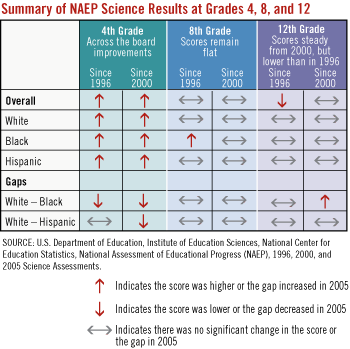Executive Summary: Science Results for Grades 4, 8, and 12

Compared to middle and high school students, younger students are making the most progress in science. In 2005, a representative sample of more than 300,000 students in grades 4, 8, and 12 were assessed in science. This website presents national results for all three grades, and state results for grades 4 and 8. The 2005 results are compared to those from 1996 and 2000. Sample questions are presented to illustrate the types of skills and knowledge that were assessed at each grade. Aspects of schooling—such as teachers' time spent on instruction, teachers' preparation, and courses taken by students—are also reported.
At grade 4, the average science score was higher in 2005 than in earlier years. The percentage of students performing at or above the Basic achievement level increased from 63 percent in 1996 to 68 percent in 2005. An example of the knowledge associated with the Basic level is identifying two organs in the human body that work together to supply oxygen. Twenty-nine percent performed at or above the Proficient level. Relating the amount of time a candle burns to the amount of air available is an example of the knowledge and skills at the Proficient level.

At grade 8, there was no overall improvement. In 2005, 59 percent of students scored at or above the Basic level. An example of the knowledge and skills at the Basic level is being able to compare changes in heart rate during and after exercise. Twenty-nine percent performed at or above the Proficient level. Identifying the energy conversions that occur in an electric fan is an example of the knowledge and skills at the Proficient level.
At grade 12, the average score declined since 1996. In 2005, 54 percent of students scored at or above the Basic level. Knowing the function of a neuron is an example of knowledge at the Basic level. Eighteen percent performed at or above the Proficient level. Identifying the source of heat energy released in a combustion reaction is an example of knowledge at the Proficient level.
5 States Take the Lead in Score Gains
Most states showed no improvement at grades 4 and 8. Five of the 37 participating states, however, did improve between 2000 and 2005—and did so at both grades. Those states were California, Hawaii, Kentucky, South Carolina, and Virginia. At grade 4, Virginia was also among the top seven jurisdictions in 2005. Since 2000, 9 states improved at grade 4, and 11 states improved and 4 declined at grade 8. More...
Minority Students Are Making Gains at Grades 4 and 8
Minority students in grades 4 and 8 are making progress. At grade 4, average scores increased by 7 points for Black students, and by 11 points for Hispanic students, since 2000. White and Asian/Pacific Islander fourth-graders also improved since 1996, as did Hispanic and Black students. At grade 8, Black students were the only racial/ethnic group to make gains since 1996, and no racial/ethnic group showed improvement since 2000. More...
Score Gaps Narrowed Between Younger White, Black, and Hispanic Students
Due largely to gains made by minority students, the score gaps between fourth-grade White students and their Black and Hispanic peers were smaller in 2005 than in 2000. The gap between White and Black students narrowed by 4 points since 2000, while the gap between White and Hispanic students narrowed by 8 points. The gap between White and Black twelfth-graders, however, widened during the same time period. More...